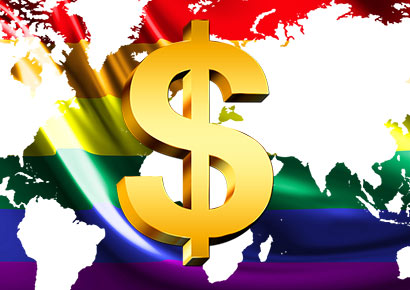The economic cost of homophobia to anti-LGBTQ nations
 A new report has revealed that the more than 70 countries that criminalise homosexuality suffer significant economic disadvantages as a result, thereby hampering their development and prosperity.
A new report has revealed that the more than 70 countries that criminalise homosexuality suffer significant economic disadvantages as a result, thereby hampering their development and prosperity.
These costs include lost tourism revenue, lost inward foreign aid and investment and lost talent and skills as LGBT+ people flee abroad.
The human rights abuses meted out by homophobic nations on their LGBT+ citizens is often solely seen as a violation of human rights, but the report by the Peter Tatchell Foundation in the UK argues that anti-LGBT+ legislation is also bad for the economy. It found that the 71 countries that still criminalise homosexuality are losing out on the economic advantages that more gay-friendly nations enjoy.
The report, The Economic Cost of Homophobia, doesn’t gloss over the human rights abuses endured by hundreds of millions of LGBT+ people worldwide but shows that discriminating nations have an economic reason, apart from human decency, to repeal unjust, outdated and unnecessary laws.
“The loss of inward foreign aid and investment to countries with anti-LGBT+ laws is considerable,” said the foundation’s director, British activist Peter Tatchell. “LGBT+ people and allies are less likely to holiday in homophobic countries; potentially depriving these countries of billions in tourism revenue.”
According to the report, countries that criminalise homosexuality – which are often developing nations in desperate need of foreign income – are jeopardising their share of an LGBT+ travel market estimated to be worth a whopping US$211 billion per year.
It cites studies that show that 67% of LGBTQ travelers selected anti-LGBTQ laws as a major factor in choosing a holiday destination. When one adds research showing that LGBTQ travellers from the US spend 57% more than their heterosexual counterparts, the impact becomes clearer.
The report also looks at how discriminatory laws are increasingly putting off global companies, aid donors and consumers. It includes examples such as Uganda, which lost considerable foreign aid and investment because of its 2014 anti-homosexuality law.
Richard Branson, head of the Virgin group of businesses, said at the time that he would not be investing in, or doing business with, Uganda due to its discrimination against its LGBT+ community. He urged other businesses to follow suit.
The research further addresses the “brain drain” caused by LGBT+ people fleeing from homophobic nations to resettle in more gay-friendly ones. “This damages the social and economic vitality of their home countries,” said Tatchell. “Outlawing homosexuality is encouraging the emigration of highly educated LGBT+ individuals and impacting negatively on tax receipts and innovation through deterring inward aid and investment.
“We also show that the multiple forms of harassment and intolerance suffered by LGBT+ citizens within discriminatory countries… leads to lost productivity in the workplace and damages mental and physical health – which ultimately burdens the state,” noted Tatchell.
“The report argues that anti-LGBT+ laws present not only social and economic drawbacks for individual LGBT+ people, but their very existence impedes the wider economic development and long-term prosperity of a nation,” he said.
Leave a Reply